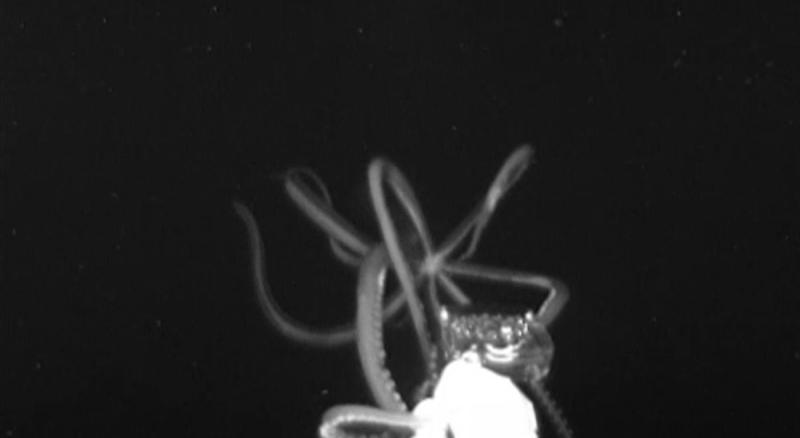How scientists caught footage of 'the kraken' after centuries of searching
By: Brandon Specktor (livescience. com)


The linked article contains a short 30 second video showing the kraken in action.

Architeuthis dux — the world's largest known squid — is surprisingly camera shy.
The elusive giant squid has wriggled its way into folklore for thousands of years, inspiring tales of fearsome krakens with bodies as large as islands. In reality, A. dux is a tad smaller than that, capable of growing to about 46 feet (14 meters) long — about the length of a semi-trailer.
But despite their size, these cephalopods are almost never seen in the water; most observations of the behemoths come from dead or dying squids that wash up on shores or become ensnared in deep-sea trawling nets. That finally changed in 2012, when a team of marine scientists filmed a young A. dux in its natural habitat, about 2,000 feet (630 m) below the sea south of Japan.
Now, a study published online in the journal Deep Sea Research Part 1: Oceanographic Research Papers delves into why these giants of the deep are so elusive, and explains how a team of researchers was able to capture the first footage of A. dux in its natural habitat in 2012, and again in 2019 in the Gulf of Mexico.
According to the study authors (many of whom were present for the 2019 giant squid sighting), the creature's evasiveness is due, in part, to its enormous eyes.
Giant squids can live thousands of feet below the ocean's surface. Very little sunlight can penetrate this deep so to adapt, the giant squid evolved the largest eyes in the animal kingdom. Each of these cephalopods' peepers are about as large as a basketball — roughly three times the diameter of any other animal, Live Science previously reported.
These huge eyes not only help giant squids make their way around the deep, dark ocean, but probably also make them extra sensitive to the bright lights that marine researchers mount to their submersibles and underwater cameras, according to the study authors. That sensitivity could explain why giant squids are so hard to find in their natural habitats; by the time a research vehicle reaches a squid's swimming grounds, the squid has long since fled the craft's lights and vibrations.
To correct this over-illumination, the researchers involved in the 2012 and 2019 A. dux sightings turned down the lights on their submersible (named the Medusa). After reaching the desired depths, the Medusa turned off its lights and stopped moving, allowing creatures of the deep to come to it rather than actively navigating across the bottom of the sea. The team also illuminated its camera with a dim red light instead of the bright white lights typically used on expeditions like these, capitalizing on a natural deep-sea color-blindness.
"Many deep-sea species, including squid, have monochromatic visual systems that are adapted to blue [light] and blue bioluminescence rather than long wavelength red-light," the researchers wrote in the study. "Using red light may thus be a less obtrusive method for illuminating deep-sea species for videography."
The researchers also used the squids' attraction to blue light to their advantage, outfitting the Medusa with a custom lure that they called the E-Jelly. This small, spinning ring of neon blue lights sat on the end of an outstretched arm, mimicking the movement and glow of a bioluminescent jellyfish.
The lure worked, drawing A. dux out of the darkness in both 2012 and 2019. In fact, the giant squid spotted in the Gulf of Mexico was a little too convinced by the E-Jelly's display; as footage of the encounter shows, the giant squid tried to attack the Medusa's camera arm with its tentacles in the hope of taking home a nice jellyfish meal. (This assault enabled the team to measure the squid's tentacles, which appeared nearly 6 feet, or 1.8 m, long).
This strategy of combining low-light equipment with bioluminescent bait seems to be the most effective known method of tricking the giant squid out of hiding, the researchers concluded. That's a handy trick, as there is much to learn about the kraken's behavior that can only come to light in the darkness of its natural habitat.
Originally published on Live Science.






Krakens (giant squid) are shy monsters.
You’d think that for science’s sake, they’d have sent a diver out there to pose with it for perspective. Get that intern into a suit!
Hah, I think you might have a hard time finding someone willing to do that. Do they even make diving suits that could handle the pressure at that depth?
Honestly I’d much rather go on a spacewalk than diving a couple thousand (or however far) feet down. Probably not being able to see shit and knowing things live down there makes space more appealing.
with a sea monster ?
Yeah, Me too !
An ADS suit could handle 2000 ft down. The SCUBA max is currently just under 1100 ft
So it’s doable! But still, fuck that lol.
Lol agreed
That's why you take an intern with you. They'll do anything.